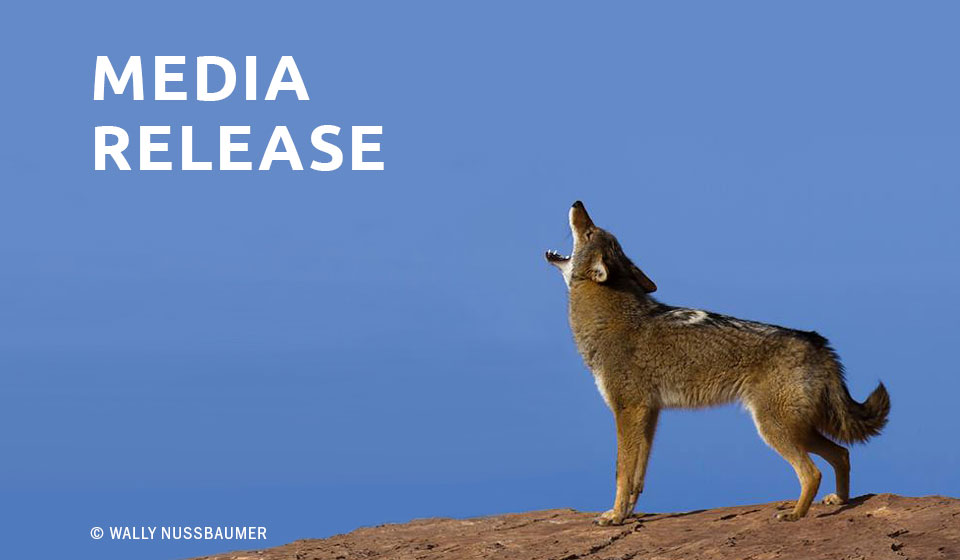FOR IMMEDIATE RELEASE — April 18, 2022
USDA’s Wildlife Services wastes $124 million in taxpayer dollars to slaughter wildlife
Your taxes fund federal program killing 1.76 million animals in 2021
Mill Valley, Calif. — In the midst of catastrophic biodiversity collapse and the climate crisis, Wildlife Services, a federal program within the U.S. Department of Agriculture, killed over 1.76 million animals last year, including more than 400,000 native animals.
Wildlife populations have plummeted by more than two-thirds in the last 50 years. One million of the estimated eight million plant and animal species on the planet are at risk of extinction, in what scientists have identified as the sixth mass extinction event – this time driven primarily by human activities. In the face of these crises, Wildlife Services activities are contributing directly to the massive loss of wildlife all while using taxpayer dollars to fund the killing.
Wildlife Services spent over $124 million in taxpayer dollars in 2021 to kill wildlife, despite a growing body of peer-reviewed research showing that reckless slaughter of native carnivores causes broad ecological destruction and is not proven to protect livestock or reduce human conflicts with wildlife.
In Wildlife Services’ 2021 annual reporting, coyotes once again landed on the top of the kill list, despite predators collectively accounting for less than 1 percent of all livestock deaths. Wildlife Services’ targeting of coyotes directly undermines the important ecological role they contribute to ecosystem health and biodiversity.
In total, Wildlife Services killed a shocking 404,538 native animals last year, including 64,131 coyotes, 433 black bears, 200 mountain lions, 605 bobcats and 324 gray wolves.
Across the country, Wildlife Services continues to use indiscriminate and inhumane tools to kill wildlife including traps, snares, poisons and aerial gunning. Condemned by scientists with the American Society of Mammalogists, this taxpayer-subsidized program focuses on lethal and non-selective killing practices despite readily available and effective non-lethal methods and animal husbandry practices that prevent conflict.
Wildlife Services’ lethal methods also result in the killing of thousands of non-target animals, including endangered species and companion animals. In 2021, almost 3,000 animals were accidentally killed, including federally protected species such as bald eagles and golden eagles. An investigative report by the Sacramento Bee found that these unintentional killings are routinely underreported and do not include indirect deaths, such as secondary poisoning from the carcasses of animals that die from lethal compound 1080.
“In all my years of trying to work with Wildlife Services, I have yet to encounter any willingness from the program to consider the best available science demonstrating that nonlethal tools are the most effective ways to protect livestock,” said Michelle Lute, PhD in wildlife management and national carnivore conservation manager for Project Coyote. “Instead, they insist on retaining every archaic tool in their lethal arsenal even when it repeatedly endangers people’s children and companion animals and does nothing to protect livestock.”
A growing national coalition of wildlife conservation organizations are working together to push reform of USDA Wildlife Services and press for a shift to non-lethal approaches to livestock-wildlife conflicts.
In California, communities are challenging Wildlife Services activities. In 2014, Project Coyote and allies sued Mendocino County over its $144,000 contract with Wildlife Services for failing to conduct an environmental review in violation of the California Environmental Quality Act (CEQA). The county Board of Supervisors ended its contract with Wildlife Services after a groundswell of residents pushed for an end to the deadly program in 2021. Project Coyote’s Dr. Lute is working with Mendocino County to develop a program to support residents and local livestock operators with nonlethal conflict prevention and humane wildlife exclusion.
CEQA has been a powerful tool that also led to Sonoma, Shasta and Siskiyou counties ending their contracts with Wildlife Services. Just last month, Project Coyote and Feather River Action! sued the counties of Plumas and Sierra for the same violation in their contract with Wildlife Services.
Marin County ended its contract with Wildlife Services in 2000, replacing it with a cost-share program supporting ranchers with science-based non-lethal practices to reduce conflicts between livestock and wildlife. According to the Marin County Department of Agriculture, livestock losses have declined by 62% from 2002 to 2011.
“American taxpayers need to know that they are unknowingly supporting a rogue program that kills hundreds of thousands of animals every year – including endangered species and pets – largely at the behest of private agricultural interests and often for no reason other than being in the wrong place at the wrong time,” said Camilla Fox, founder and executive director of Project Coyote. “Neither science nor ethics can defend this ongoing and expensive war against our nation’s wildlife. It’s time for a paradigm shift in how we live with and make room for the other species with whom we share this planet.”
###
Project Coyote, a national non-profit organization, is a North American coalition of scientists, educators, and citizen leaders promoting compassionate conservation and coexistence between people and wildlife through education, science and advocacy. Visit ProjectCoyote.org for more information.
Camilla H. Fox
Founder & Executive Director
Michelle Lute, PhD
National Carniovore Conservation Manager



